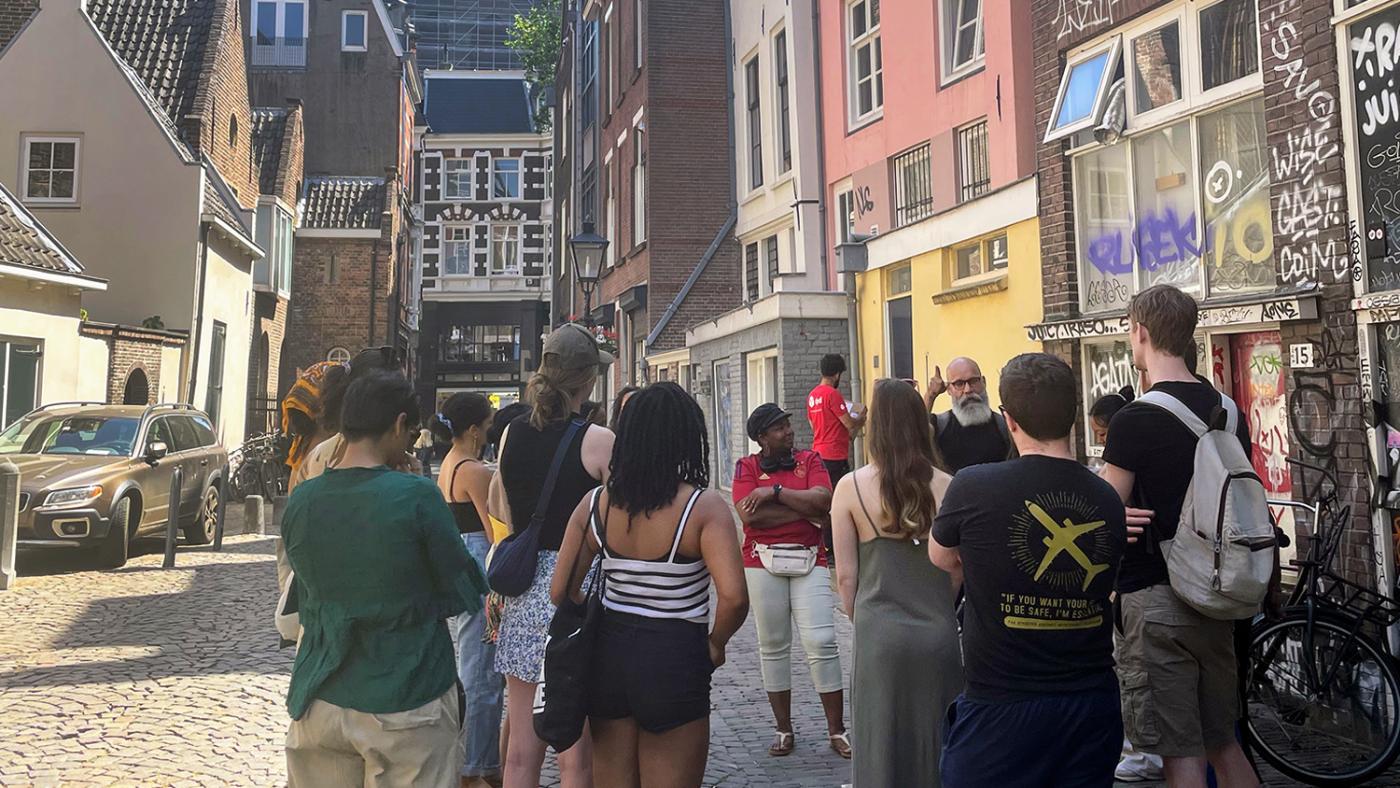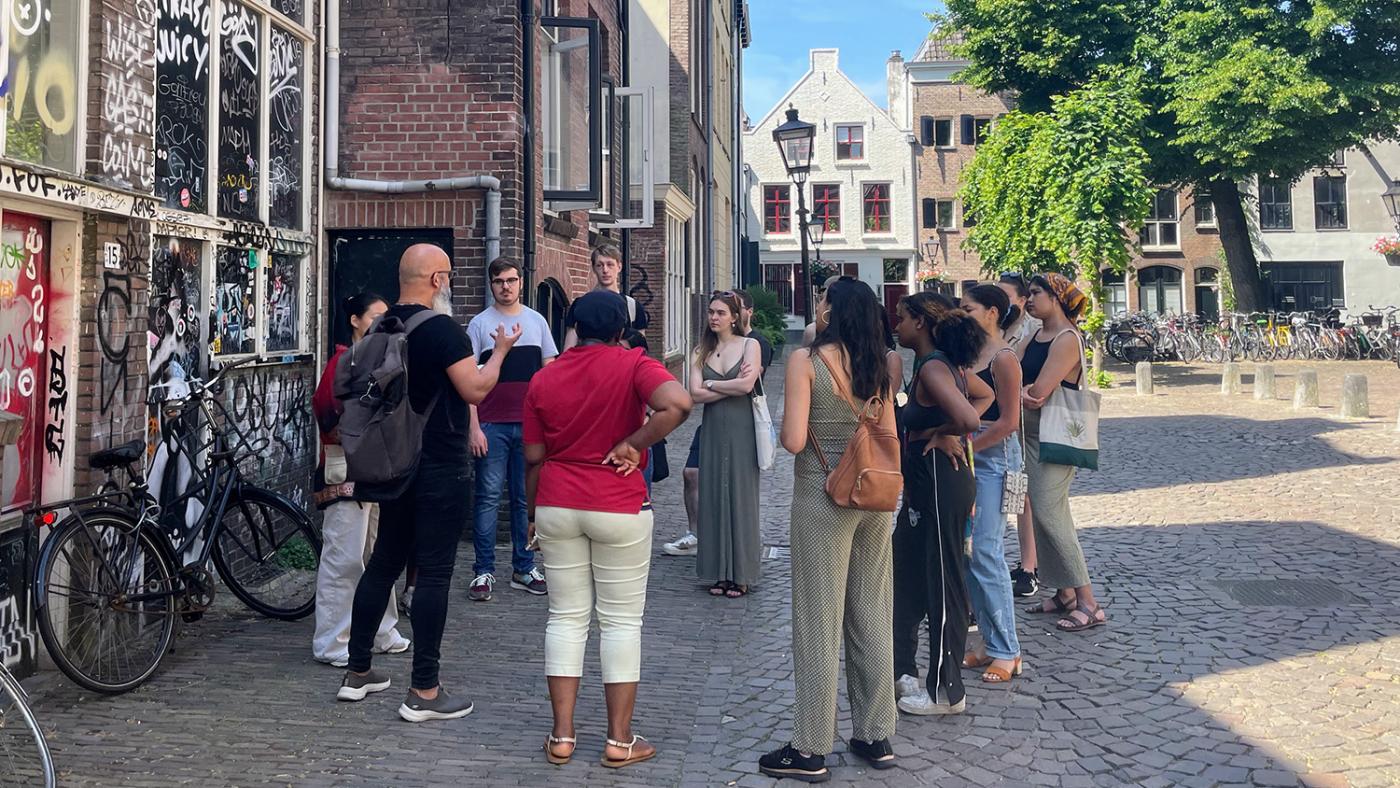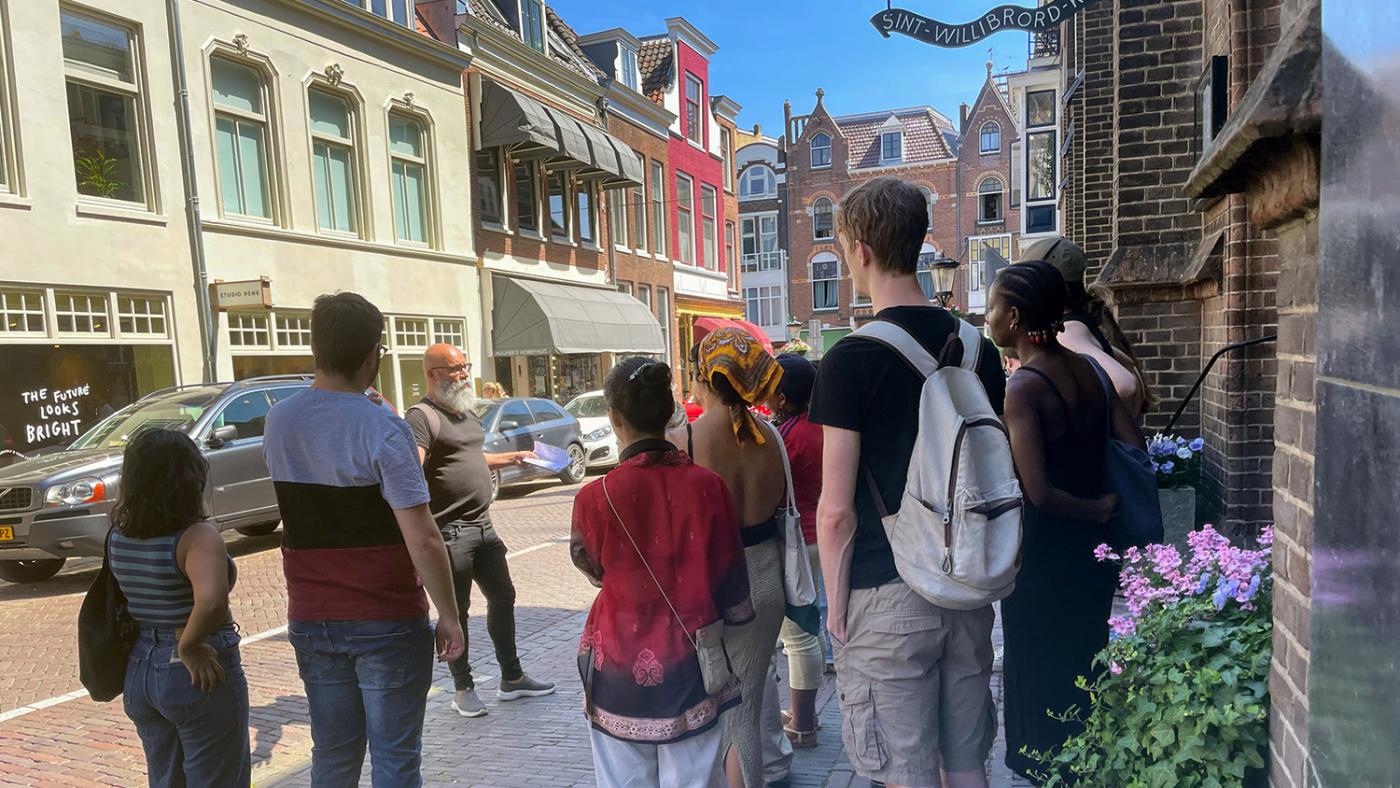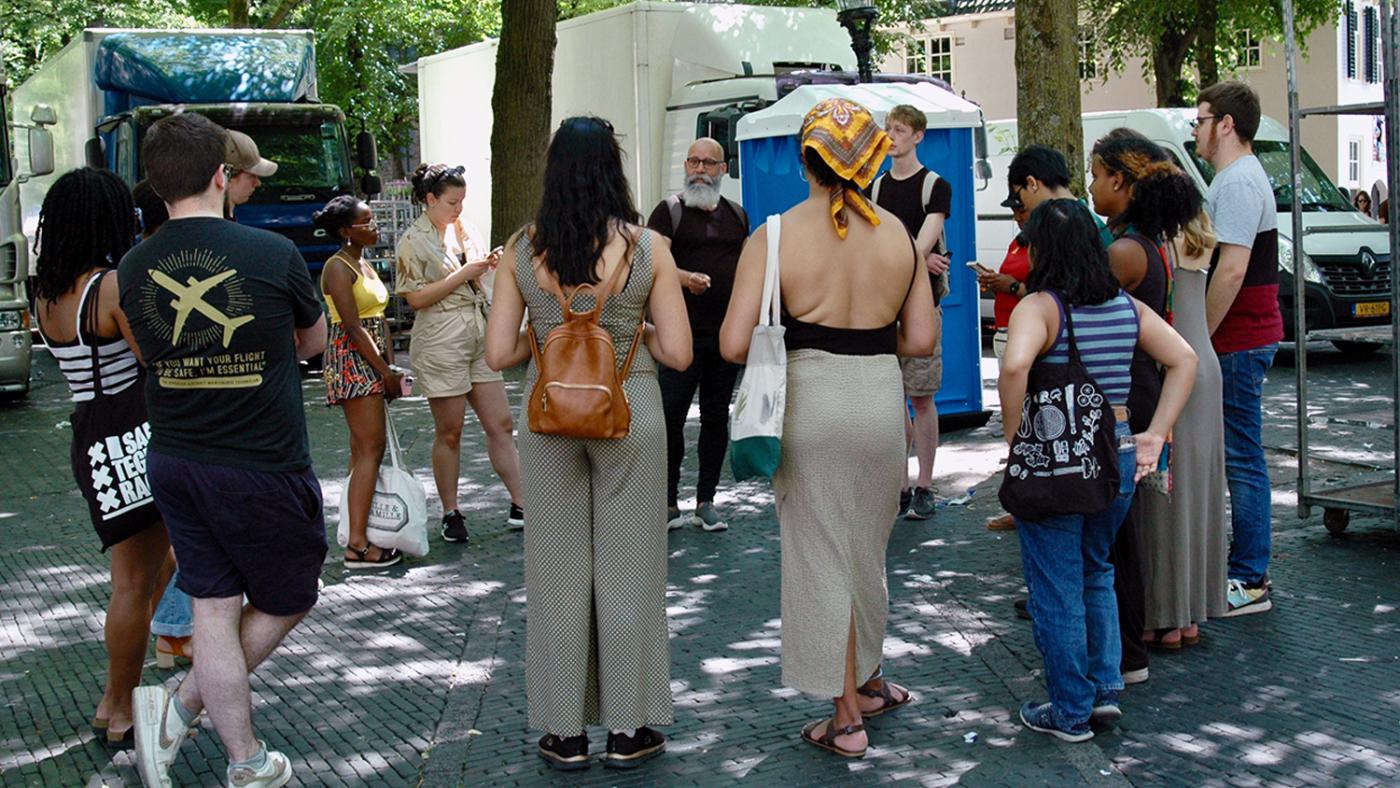A tour with the African Caribbean Heritage Network
'It's strange that fewer and fewer students are aware of the origins and consequences of slavery'

It’s a little before 11:00 am on a Saturday morning. Seven people are gathered in a semicircle in front of Broese, the bookstore on Oudegracht. The mood is relaxed. “Hi, everyone. We’re still waiting for a couple of people to join us. So, if anyone wants to use the bathroom or get a cup of coffee, go ahead.” The enthusiastic person saying this is Makeda Ferguson, president of the student association African Caribbean Heritage Network (ACHN), the group organising the event. This is not the first time this happens. The association has also held a similar walking tour in Amsterdam and a guided museum visit in Rotterdam. Dinners, dance workshops and movie nights are also part of the association's agenda. Today is all about slavery in Utrecht.
Founded two years ago, ACHN currently has thirty members who meet about once or twice a month. The aim of the network is to connect, gather and support students and employees from Utrecht University as well as provide information about the history and cultures of the African and Caribbean diaspora. But, above all, the association wants to create a safe environment. “When you’re part of a minority, no matter where you are, it’s extremely reassuring to have a place where you don’t feel like you’re standing out,” Makeda elaborates. “A place where you can share your experiences without being the exception."
Ferghall Vlaun, PR manager at ACHN, agrees. “In a city like Utrecht, where diversity is lacking, especially at the university, it’s important to remind students that they’re not alone.” Rahel Abraham, the network's secretary, adds: "We also create the possibility to celebrate African-Caribbean heritage, which does not happen at other student organisations. We offer workshops about topics that are close to our hearts and we have conversations with a range of entities within the university”.
Meanwhile, the number of people in the group has risen to nineteen. One of them is the tour guide Frank Irving, who is part of the Sporen van Slavernij (Traces of Slavery) initiative. Today, he will be guiding the group through the heart of the city, taking them back to Utrecht in the 17th and 18th centuries. It's a Saturday morning, though, so the city centre will soon get pretty crowded. Frank sets off right away. “In Utrecht, the traces of slavery might not be as visible as in Amsterdam or Rotterdam but there is plenty to tell,” he says. “With the foundation of the United East Indian Company (VOC), the West Indian Company (WIC) and the Dutch interference in the slave trade, the people of Utrecht became directly or indirectly involved in the slavery system." Cyclists pass us by an inch while Frank tells the story of Georges Beens who lived in Utrecht and was a violent slave trader, trading about two hundred people each year, for his own gain.

According to Makeda, who’s doing a Master's in Sustainable Business & Innovation, it’s high time for a discussion about the slavery system, particularly about the university's involvement with it. “The history of slavery is also the history of Europe. Therefore, it’s strange that fewer and fewer people — especially students — are aware of the origins and consequences of slavery. It’s important to understand a system from which academia has profited in a myriad of ways and which influenced the academics at the time. I’ve learned about the history of slavery and its heritage, and I often see topics in my curriculum that are the result of that history. But I don’t know if my classmates have this same knowledge. For example, we always talk about the problems in the Global South, but I don’t think we openly recognise why problems exist in the Global South in the first place. That’s why I hope that we won't stop at a discussion but rather that the topic of slavery will be integrated into our education. The university should be a place that promotes curiosity and that also applies to this topic.”
Ferghall feels the same way: “This is a discussion about a historical event that still has a strong hold on our society to this day. It influences established systems in our society. To tell the entire story, we should tackle it from every possible angle. It’s the only way we can heal ourselves from this past, both individually and collectively. We’ve always been taught just one side of the story, that of the coloniser. So, we must discover the stories of the ones that not only suffered from slavery but also fought against slavery and colonisation. The story of slavery is not just a story of grief but also one of resilience, strength, and pride. That’s what we should put down in history books.”

Pieter Quint Ondaatje is an example of such resistance. After walking through narrow and less narrow streets, and dodging shoppers and street organs, Frank finally manages to take the group to Ganzenmarkt, where he tells the story of this young man of European-Asian descent, who came to Utrecht in the 18th century to study Law. Ondaatje ended up becoming one of the leaders of a patriot movement in Utrecht. A few years ago, he finally received his legacy and importance to the city were finally acknowledged (link in Dutch, Ed.) with an accompanying plaque at Lange Nieuwstraat 18.
The members of ACHN consider the fact that the university should take various cultural backgrounds into account as an open door. According to them, culture influences thoughts, the way information is interpreted, the way people treat each other, and the way people study and act at the university. “Getting in touch with other cultures provides you with new perspectives. It enables people to learn from each another,” argues Jullianna Lopez, PR manager for ACHN. “It also makes people cultivate empathy and understanding. The university can play an important part in that regard”. According to Rahel, the university could be a little bit more pro-active and listen more carefully to what students in marginalised positions have to say. ACHN could help with that but members stress that the network is mostly meant to bring people together, not to educate. “Of course, we will keep organising discussion boards and events, because we are passionate about these topics”, Makeda says. “But if the university wants to do something worthwhile, they have to go the extra mile themselves. The role of educator should not be placed in the hands of a marginalised group”.

High up in the sky, the sun is approaching its highest point and the trees at Janskerkhof offer some much-needed shade. Trucks, delivery vans and scaffolding canvas partially block the view of the buildings in the backdrop — properties whose history is closely linked to slavery. Buildings that were home to powerful families who traded hundreds of people, like that of Gideon Boudaen, who had a prominent career at VOC. The majority of passers-by have no idea about that. Utrecht University has now decided to unveil this history, which is a step forward in Ferghall's opinion: “The university is facing its own ties with slavery and how it's benefitted from it. That’s a big deal.” On July 5, UU will be organising a talk on this topic. ACHN will be there, of course. “We hope that many people will join us”, Makeda smiles. “And don’t forget: everyone who’s interested in our network is always welcome. We’d love to meet you!”
Since 2022, Utrecht University has been conducting research into its own connection with the Dutch slave trade. The decision was informed by the ties the city of Utrecht had with the slave trade. On July 5, from 9:00 am to 1:00 pm, the university will be organising a conversation about the research with representatives of the Surinamese-Caribbean community, employees and students. The event is going to be held at Janskerkhof 3.